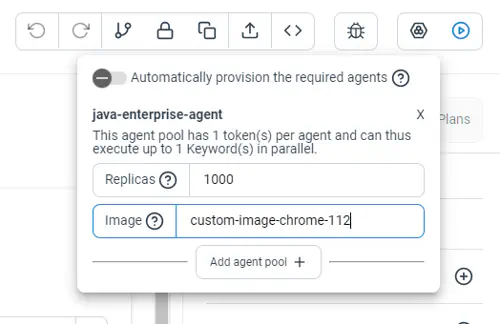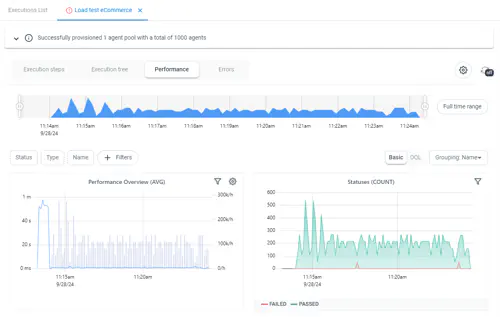Introduction to Step 26
We’re thrilled to introduce Step 26, a release filled with powerful enhancements and new features. Among the highlights are significant improvements to Dynamic Agent Provisioning, the introduction of the Step CLI, and enhancements to Automation Packages.
Explore the details below to discover the highlights of the release. For an exhaustive list of the changes, check out the release notes,
New Step CLI
The new Step CLI offers a powerful and consistent approach to building, executing, and deploying any kind of automation workflows within Step. It supports everything from local runs to large-scale executions, while also enabling the deployment of self-service workflows and scheduling executions.
Key features
- Local Development - Build and test automation packages locally or within your DevOps pipeline.
- Centralized Execution - Trigger the central execution of automation packages at scale, scaling from 1 to 5,000 workers on-demand.
- Central Deployment - Deploy automation packages centrally, enabling access to self-service workflows and the scheduling of executions for the Post-Deploy phases of your product.
- Workflow-Agnostic - The CLI is universally applicable to all types of workflows supported by Step, including E2E tests, load tests, RPA, and synthetic monitoring.
How it works
Try it out
We will be updating our tutorials step by step after the release, but we’ve already updated one of our most popular tutorials to showcase the new CLI: Load testing with Cypress
For more detailed information on the Step CLI, please visit the full documentation.
Dynamic Agent provisioning
In Step 25, we introduced a beta version of the agent provisioning module. Now, with Step 26, we’re proud to present a significantly enhanced version of this feature, offering key improvements: support for custom images, enhanced reporting of provisioning logs, improved performance, and full support for all Step agent types.
Key features
- Dynamic agent provisioning upon execution, now supporting up to 5000 workers
- Automatic or manual agent selection based on workflow needs
- Kubernetes-native implementation with support for custom images and resource templates (StatefulSet, ConfigMaps, etc.)
- Support for all Step agent types: Default (Java, Cypress, Selenium, Playwright, etc), .NET, Node.js
How it works
Specify the required agents in the Plan editor or directly in your YAML Plan:

Upon execution, Step provisions the Agent pools automatically according to the defined settings:

Try it out
Once Step 26 is available on SaaS, we will update all our tutorials to make use of automatic agent provisioning. If you’d like to try the new feature now on an on-premises instance of Step, the following tutorial has already been updated: Load testing with Cypress
For more detailed information about Agent Provisioning, please visit the full documentation.
Enhanced Automation Packages
Automation Packages, which enable engineers to define workflows as code across the entire DevOps lifecycle, have quickly become one of our most popular features, and we’re thrilled to announce new improvements:
- Support for all keyword types – The wide range of integrations supported by Step are now available in Automation Packages. Read more
- Modular package descriptors – Use fragments to define automation packages more efficiently Read more
- Tag plans with categories – Add categories to the plans within Automation Packages and use these categories at execution time for filtering
- Store Automation Packages in artifact repositories – Trigger their executions in Step via CLI. Read more
- And more!
Notification Presets
Step 26 introduces notification presets, a more flexible approach to defining Webhook and E-Mail notification content.
Key features
- Layered definitions - Presets build on each other, allowing to partially predefine notifications at different levels.
- Flexibility - Predefine everything and make sending notifications extremely simple for your users, or leave definitions open to changes for maximum user control – the choice is yours.
- Extensibility - The underlying data model was designed to easily support potential new notification and integration mechanisms in the future.
For more detailed information about the new Notification Presets, please visit the full documentation.